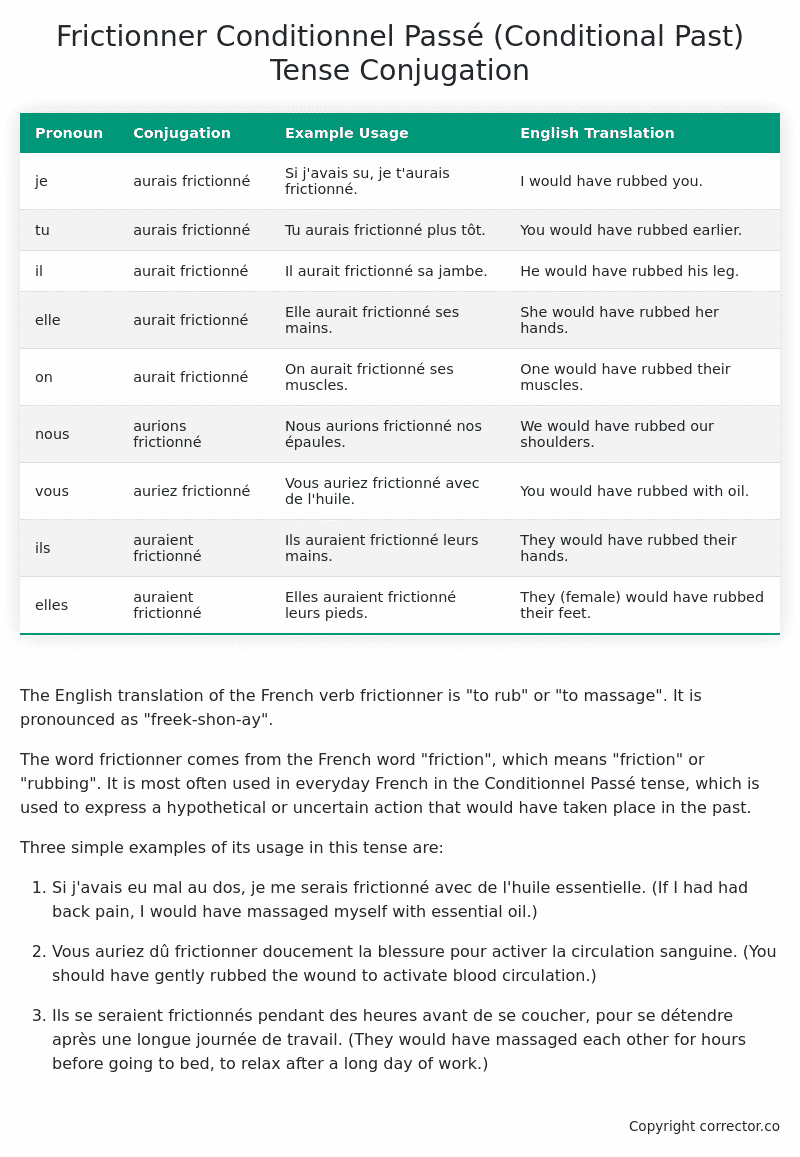Conditionnel Passé (Conditional Past) Tense Conjugation of the French Verb frictionner
Introduction to the verb frictionner
The English translation of the French verb frictionner is “to rub” or “to massage”. It is pronounced as “freek-shon-ay”.
The word frictionner comes from the French word “friction”, which means “friction” or “rubbing”. It is most often used in everyday French in the Conditionnel Passé tense, which is used to express a hypothetical or uncertain action that would have taken place in the past.
Three simple examples of its usage in this tense are:
-
Si j’avais eu mal au dos, je me serais frictionné avec de l’huile essentielle. (If I had had back pain, I would have massaged myself with essential oil.)
-
Vous auriez dû frictionner doucement la blessure pour activer la circulation sanguine. (You should have gently rubbed the wound to activate blood circulation.)
-
Ils se seraient frictionnés pendant des heures avant de se coucher, pour se détendre après une longue journée de travail. (They would have massaged each other for hours before going to bed, to relax after a long day of work.)
Table of the Conditionnel Passé (Conditional Past) Tense Conjugation of frictionner
| Pronoun | Conjugation | Example Usage | English Translation |
|---|---|---|---|
| je | aurais frictionné | Si j’avais su, je t’aurais frictionné. | I would have rubbed you. |
| tu | aurais frictionné | Tu aurais frictionné plus tôt. | You would have rubbed earlier. |
| il | aurait frictionné | Il aurait frictionné sa jambe. | He would have rubbed his leg. |
| elle | aurait frictionné | Elle aurait frictionné ses mains. | She would have rubbed her hands. |
| on | aurait frictionné | On aurait frictionné ses muscles. | One would have rubbed their muscles. |
| nous | aurions frictionné | Nous aurions frictionné nos épaules. | We would have rubbed our shoulders. |
| vous | auriez frictionné | Vous auriez frictionné avec de l’huile. | You would have rubbed with oil. |
| ils | auraient frictionné | Ils auraient frictionné leurs mains. | They would have rubbed their hands. |
| elles | auraient frictionné | Elles auraient frictionné leurs pieds. | They (female) would have rubbed their feet. |
Other Conjugations for Frictionner.
Le Present (Present Tense) Conjugation of the French Verb frictionner
Imparfait (Imperfect) Tense Conjugation of the French Verb frictionner
Passé Simple (Simple Past) Tense Conjugation of the French Verb frictionner
Passé Composé (Present Perfect) Tense Conjugation of the French Verb frictionner
Futur Simple (Simple Future) Tense Conjugation of the French Verb frictionner
Futur Proche (Near Future) Tense Conjugation of the French Verb frictionner
Plus-que-parfait (Pluperfect) Tense Conjugation of the French Verb frictionner
Passé Antérieur (Past Anterior) Tense Conjugation of the French Verb frictionner
Futur Antérieur (Future Anterior) Tense Conjugation of the French Verb frictionner
Subjonctif Présent (Subjunctive Present) Tense Conjugation of the French Verb frictionner
Subjonctif Passé (Subjunctive Past) Tense Conjugation of the French Verb frictionner
Subjonctif Imparfait (Subjunctive Imperfect) Tense Conjugation of the French Verb frictionner
Conditionnel Présent (Conditional Present) Tense Conjugation of the French Verb frictionner
Conditionnel Passé (Conditional Past) Tense Conjugation of the French Verb frictionner (this article)
L’impératif Présent (Imperative Present) Tense Conjugation of the French Verb frictionner
L’infinitif Présent (Infinitive Present) Tense Conjugation of the French Verb frictionner
Struggling with French verbs or the language in general? Why not use our free French Grammar Checker – no registration required!
Get a FREE Download Study Sheet of this Conjugation 🔥
Simply right click the image below, click “save image” and get your free reference for the frictionner Conditionnel Passé tense conjugation!

Frictionner – About the French Conditionnel Passé (Conditional Past) Tense
Formation
Common Everyday Usage Patterns
Expressing Unreal Past Scenarios
Polite Requests or Suggestions
Expressing Doubt or Uncertainty
Interactions with Other Tenses
Conditional Present
Indicative Past Tenses
Conditional Future
Summary
Want More?
I hope you enjoyed this article on the verb frictionner. Still in a learning mood? Check out another TOTALLY random French verb conjugation!


